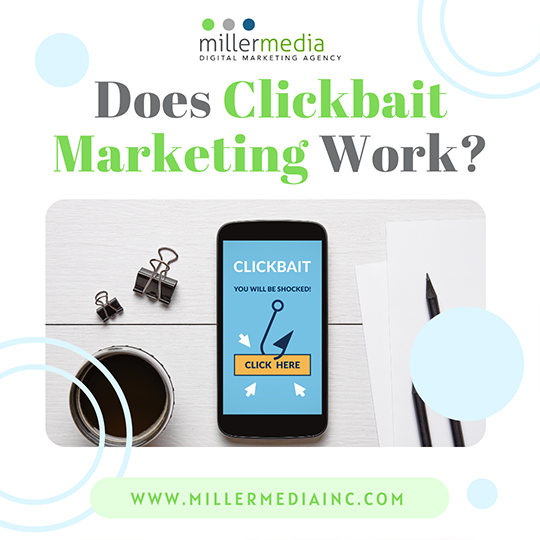We all want to create content that draws our audience to our website, but there are some techniques that could be hurting your SEO. If your webpage title, headings, and URL are not relevant to its content promised, Google might penalize you, which could severely impact your rankings. Using clickbait titles with outrageous claims to lure users can negatively affect your digital PR, brand reputation, and increase your bounce rate. Also using sketchy backlinks from less reputable sites can hurt your Page Authority score and page rank. In short, you want to avoid clickbait on your business’s website.
What are Some Best Practices to Avoid Clickbait?
Google’s algorithms can understand the content on your site and will check if it matches its headline and page title, so it is vital that you pay attention to your word structure. Google’s Page Title Update back in 2001 enables the search engine to display a “replacement” title tag when your page’s title does not accurately match its content. Make sure to check your page title and headers that they accurately represent what your content is about.
How to Create SEO-Friendly Titles & Headings
Start by doing keyword research. This can help you discover target keywords that you can include in your web page’s title, headings, and body copy. Using your target keywords throughout your content signals to Google that your page is relevant to your target keyword. You can use Google’s Keyword Planner to discover relevant or related keywords to target with your content and ads or hire a digital marketing agency with SEO services. Once you have your keywords, it’s important to implement them into your content. Include your target keywords in your page title and headings. Make sure you proofread to find and fix keyword stuffing in your content. Your goal is to make it friendly to web crawlers and readers. Pretend that you are a 5th grade teacher and write your article in a simple manner. For your content’s semantically related keywords make sure to also check readability, page title meta descriptions, and backlinks.
Successfully Match the User’s Search Intent
There are 4 types of user intent you can tailor your content to. Let’s take a look:
- Navigational Intent
When a user wants to navigate to or around a specific website of a specific company, they will likely add branded keywords in their search (ex. “Starbucks website”). Target these branded keywords with ads to increase brand awareness.
- Informational Intent
When users want more information on a certain topic. They might ask questions or use keywords that indicate they’re looking for help (ex. “Where can I get a pumpkin spice latte?”). Target keywords with informative content, like videos, lists, infographics, blog, and tutorials. Focus on creating useful, actionable content that answers your readers’ questions. This also may help lessen the number of common questions your potential client needs to ask, quickening the path to purchase.
- Commercial Investigation Intent
Once a user decides they want to purchase a product or service from your company, they will likely perform a search to compare the different options available (ex. “Starbucks vs Tim Hortons.”) Target keywords with comparison articles of your competition, reviews of the use of similar products/services, and how-to guides to capture web traffic.
- Transactional Intent
Certain keywords or phrases signal that a user is ready to buy (ex. “Add to Order”). Users are ready to buy and are now searching for the best price value or deal. They are more likely to be susceptible to clickbait while looking for the best deals. Be extra careful when creating discounts or being transparent with your pricing. Make sure if it has an expiration date it is easily readable or if it is a subscription the yearly or month payment is accurate. Target keywords with strong, SEO-friendly content that highlights your unique selling proposition. Also target these keywords with ads, but make sure your CTA is clear, precise, and your landing page reflects what is in the ad.
Avoid clickbait SEO practice and call us at 248.528.360.

